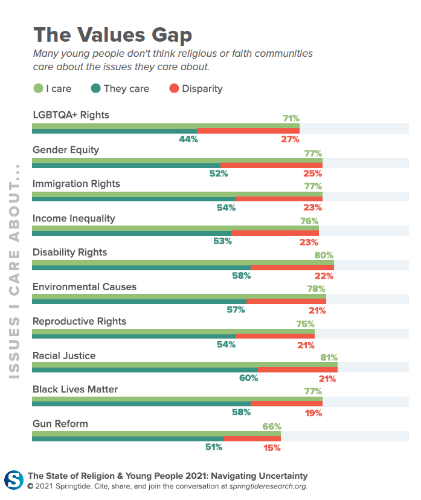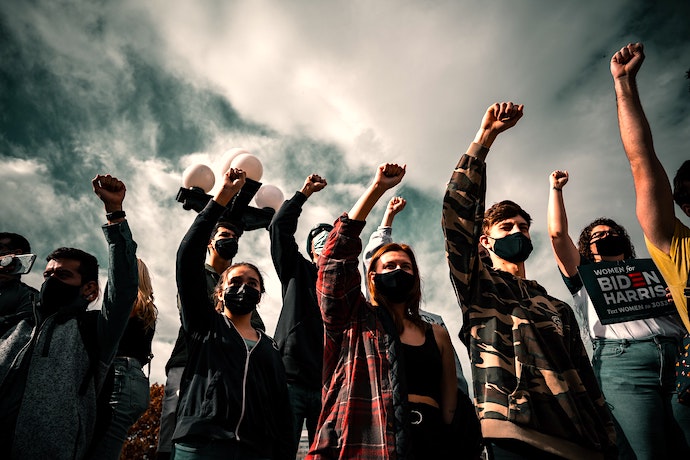Generation Z, or those born roughly between 1995-2010, have come of age during two vastly different presidencies; the legalization of gay marriage; numerous school shootings and the protests that followed; the murder of George Floyd and the rise of Black Lives Matter; #MeToo and the women’s march; battles over trans rights; a Muslim ban and a historically low refugee ceiling; unprecedented threats on abortion and contraception access; and now a global pandemic.
This is also the social and political context in which Gen Z developed their values, while enjoying access to an enormous volume of information on social media about the inequities in our society that perpetuate human suffering. As they’ve seen and heard their peers of nondominant identities testify to the discrimination they experience, many young people have taken up causes to dismantle the societal systems and norms that oppress them.
Though a majority of young people say they engage in acts of protest as a religious or spiritual practice, many do not believe faith groups share their interest in supporting LGBTQ+ rights, gender equity, racial justice, and more. This is according to The State of Religion & Young People 2021 from Springtide Research Institute, where I serve as Executive Director, which surveyed over 10,000 young people between the ages of 13-25 about their spirituality.
 This disconnect in values is likely a major reason why, although 71% of young people told us they’re at least slightly religious, only 16% said they turn to someone from their religious community during challenging times—the same percentage who said they turn to “no one.” Of those young people who identified as “very religious,” less than half (40%) told us they found connecting with their religious community helpful during challenging times.
This disconnect in values is likely a major reason why, although 71% of young people told us they’re at least slightly religious, only 16% said they turn to someone from their religious community during challenging times—the same percentage who said they turn to “no one.” Of those young people who identified as “very religious,” less than half (40%) told us they found connecting with their religious community helpful during challenging times.
When we asked participants why they don’t turn to religious communities, the most popular response selected was, “I don’t believe some of the things I hear talked about at religious gatherings” (60% of participants). Another popular response was, “I don’t feel like I can be my full self in a religious organization” (55% of participants), while about half of participants (47%) selected the response, “I don’t think religion, faith, or religious leaders will care about the things I want to talk about or bring up during times of uncertainty.”
A diverse group of young people who serve as student ambassadors for Springtide confirm that a disconnect in values deters Gen Z from engaging and trusting religious groups.
Lily, who is 16 and identifies as Catholic, told us:
“I feel like I often separate and section off my different worlds. I have my world of education, social justice, dance, family, faith, etc. I believe that the disconnect is that the Church is probably one of the few organizations that does not move and quickly change as social movements occur. They seem to always stay the same. For me, this can be good in terms of worship or tradition, but I also think it is evident that the Church is not responsive to the issues that are important to this generation, myself included.”
“I think we are finding out more about things that are happening in our world at a younger age, which gives us more time to figure out what we believe in,” said Zaina Qureshi, who is 16 and identifies as Muslim/spiritual.
“Due to Gen Z’s awareness of social issues, and specifically problems within a lot of institutions and churches, this makes us less open to the idea of being a part of these institutions,” she said, adding, “I don’t think this means that Gen Z is less moral. If anything, I think it’s the opposite. One of the reasons we’re so active in social issues is because we understand that we don’t need to fit inside the guidelines of institutionalized religions. We’re creating our own belief system and interpreting the importance of these issues personally.”
Blake Newborn, who is 21 and identifies as nonreligious, told us, “One of the main problems is that religion has such a controversial stance on issues like LGBT rights. There’s just so much more work to do to fully get that welcoming aspect that people deserve. I think that’s the reason why Gen Z isn’t turning to institutionalized religion is because we can see through everything. We can see that you’re not welcoming people for who they are and we don’t like that. That’s why we’re creating our own religion, or, adding piece by piece to create one big religion because everybody deserves to feel welcome for who they are.”
At the tail end of his comments, Blake refers to what Springtide is calling “faith unbundled,” or, the tendency of today’s young people to forego a single, intact religious tradition in favor of a mix of sources from various traditions (religious and otherwise) to form and inform their beliefs and practices. For many young people, these sources likely include the philosophies of activists, clergy, scholars, and others who have fought for the causes they’re passionate about.
With figures like Kimberlé Crenshaw, Sylvia Rivera, Greta Thunberg, and Bryan Stevenson informing their beliefs as much as prayer or scripture, we can conclude that fighting for the disenfranchised is not merely adjacent to Gen Z’s beliefs and values. Rather, being informed and actionable about social justice is now core to what they consider to be moral or faithful.
With this in mind, we can expect that any religious group—or frankly any institution—that fails to pursue or support productive steps toward LGBTQ+ rights, gender equity, immigration rights, racial justice, etc., will continue to have trouble appealing to Gen Z and gaining their trust.





